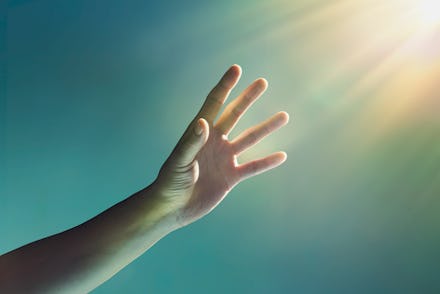How believing in something bigger than yourself can ease anxiety

As of the last few years, researchers have been trying to uncover how to best help people managing anxiety disorders, which currently afflict around 40 million people in the US. A new study conducted at the University of Toronto examined around 2,000 people in three levels of recovery from anxiety, and yielded some encouraging findings: Of the participants who had a generalized anxiety disorder (persistent and aggressive worrying to the point of life disruption) at some point in their lives, seven out of ten of them are now free of the disorder. And four out of ten were deemed to be in "excellent mental health." There were a couple of outstanding factors that helped people feel better and one of them was people's belief in something bigger than themselves. Could spirituality help alleviate anxiety?
People who used spirituality or religion to cope with their mental illness were 36% more likely to hit the high mark of having excellent mental health, according to the research. This is surprising, given that young people, especially, are increasingly distancing themselves from religion; forty-four percent of millennials do not identify as having religious beliefs. This conclusion, however, echoed what researchers have found for years: that there's a "strong link between recovery from mental illness and belief in a higher power," Esme Fuller-Thomson, lead author of the study, told EurekAlert.
People who used spirituality or religion to cope with their mental illness were 36% more likely to hit the high mark of having excellent mental health.
"Anxiety thrives in uncertainty and the unknown,” Laura Lee Townsend, a California-based therapist (who is unaffiliated with the study) says. “Spirituality is one tool that offers theories and perspectives for those large, looming unknowables we have as humans. Having the language and a framework for examining life's biggest questions can provide immense connection, comfort, and peace, which are the antidotes to anxiety."
Annie Rooney, 32, a counselor in New Orleans who's battled mental health issues for years, found solace in her spiritual beliefs. “Buddhist teachings help me acknowledge that pain and suffering are great teachers and also simply part of being human,” she says. “Pain is not the entirety of existence, but just a part." Rooney tells Mic that coming to terms with that helps her remember that she's not alone, especially when the pain becomes loud and overbearing.
Spirituality wasn’t the only factor that profoundly aided recovery, according to the research. Having support is another crucial element. “Individuals who had at least one person in their lives who provided them with a sense of emotional security and wellbeing were three times more likely to be in excellent mental health than those without a confidant,” EurekAlert reported. This finding is somewhat less surprising, as most experts agree that social support is crucial in creating stress resilience.
While the idea that spiritual practices have mental health benefits may be a surprising revelation to woo-resistant laypeople, many mental health professionals feel that the findings align with what they've observed in their patients. And they can actually overlap. “The spirituality findings are quite consistent with those having to do with having friends and relationships,” Curtis Reisinger, an NYC-based psychologist and assistant professor at Donald and Barbara Zucker School of Medicine at Hofstra University says after reviewing the research. “The key idea is that your beliefs are not yours alone. People who have social ties, including common beliefs, which confer a sense that they are not alone tend to fare much better than those who are isolated. Loneliness has a strong relationship with mental health problems,” he says.
This research offers some much needed optimism during what some people are calling an anxiety epidemic. Up to 15% of millennials suffer from anxiety and 40% of American adults. That’s about 40 million Americans total. Esme Fuller-Thomson told EurekAlert, "This research provides a very hopeful message for individuals struggling with anxiety, their families and health professionals. Our findings suggest that full recovery is possible, even among those who have suffered for many years with the disorder.”